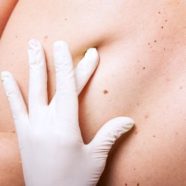Basal Cell Carcinoma
Basal cell carcinoma (BCC) is the most common form of cancer appearing frequently on the head, neck and hands as a fleshy bump, nodule, or red patch. Basal cells line the deepest layer of the epidermis and can usually be diagnosed with a simple biopsy. When detected early they can be fairly easy to treat.
BCC’s sometime resemble noncancerous skin conditions such as psoriasis or eczema. Only a trained physician can decide for sure. The five most typical characteristics of basal cell carcinoma are:
- An open sore that bleeds, oozes or crusts and remains open for a few weeks. A persistent, non-healing sore is a very common sign of an early basal cell carcinoma.
- A reddish patch or irritated area, frequently occurring on the chest, shoulders, arms or legs. Sometimes the patch crusts. It may also itch or hurt. At other times, it persists with no noticeable discomfort.
- A shiny bump or nodule that is pearly or translucent and is often pink, red or white. The bump can also be tan, black or brown, especially in dark-haired people, and can be confused with a mole.
- A pink growth with a slightly elevated rolled border and a crusted indentation in the center. As the growth slowly enlarges, tiny blood vessels may develop on the surface.
- A scar-like area which is white, yellow or waxy, and often has poorly defined borders. The skin itself appears shiny and taut. This warning sign can indicate the presence of small roots, which make the tumor larger than it appears on the surface.
For more information, please visit www.aad.org





